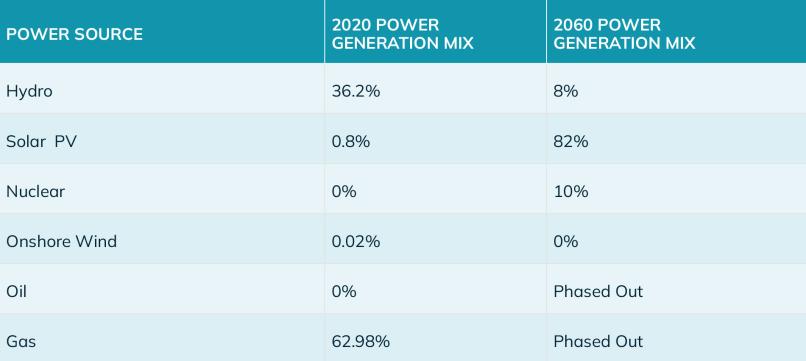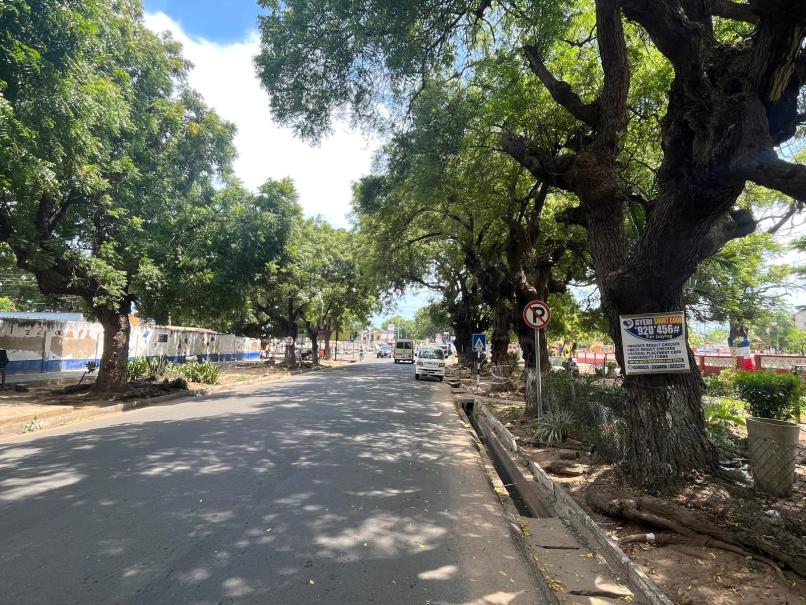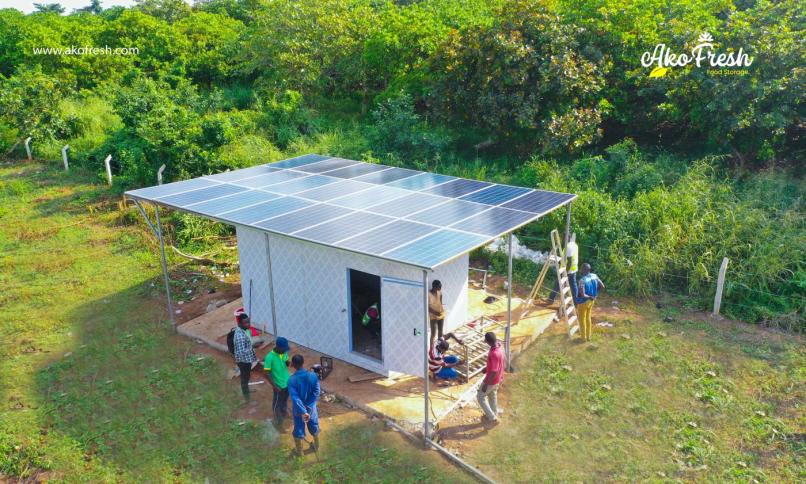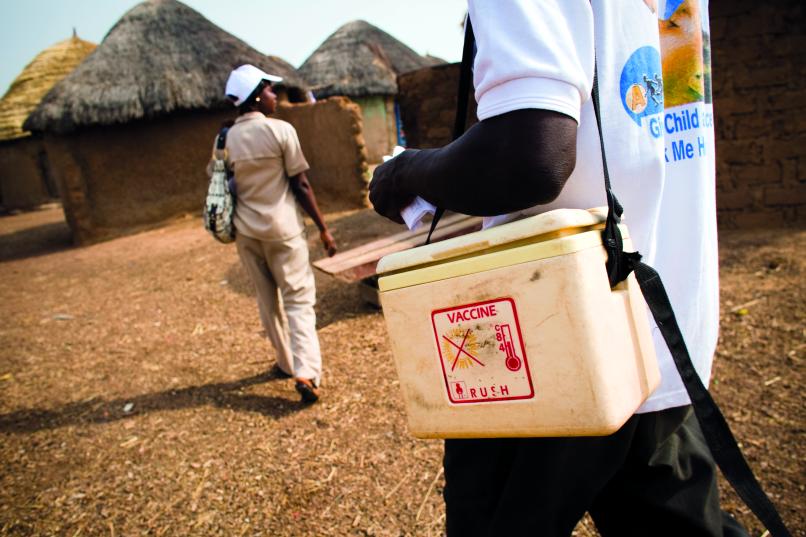Sustainable cooling for all in Ghana
To meet the needs and address challenges across all key cooling sectors in Ghana – agriculture, health services and thermal comfort – while reducing emissions and achieving sustainable cooling for all, integrated action and cross-cutting interventions are necessary across six key themes: 1) adopting passive and nature-based cooling strategies; 2) advancing higher efficiency standards for cooling products, 3) phasing out climate-warming hydrofluorocarbon (HFC) refrigerants, 4) decarbonizing the power sector; 5) promoting cooling equity and access; and 6) advancing accessible cold chains for agriculture and healthcare.

- Adoption of passive and nature-based cooling strategies such as natural ventilation, shading and climate-responsive building design. In low-rise, multi-storey office buildings in Ghana, implementing measures like efficient lighting, thermal mass, night ventilation and solar blinds can reduce cooling loads by 35 percent [19]. Moreover, traditional building materials, such as earth walls and thatched roofs, can keep indoor temperatures up to 4.5°C cooler than concrete block houses with metal roofs, and rooms with ceiling insulation can be up to 6.9°C cooler during the day. Increasing tree cover and access to sea breezes in Accra can help reduce the observed urban heat island effect (UHIE). [20] Using, pot-in-pot refrigerators, also known as zeer pots, that use evaporative cooling to preserve food without electricity can be used to extend the shelf life of agricultural products

- Advancing higher energy efficiency for key cooling appliances––fans, refrigerators, freezers and air-conditioning––through periodic revisions to Minimum Energy Performance Standards (MEPS), and optimizing cooling operations through smart controls and automation, and behavioural change such as operating higher internal cooling set points. Considering Ghana’s current MEPs for air conditioners (ACs) (see this report from GIZ), the country could feasibly push to meet U4E Model Regulation Guidelines by 2030 whilst encouraging regional harmonization.
- HFC refrigerants phase down in line with the Kigali Amendment commitments and phasedown schedule (Ghana has ratified this commitment). This includes reducing the global warming potential (GWP) of refrigerants in new and existing equipment (e.g., move to CO2-based cooling in supermarkets, enhanced AC MEPS, low GWP limit for AC refrigerants) and preventing HFC emissions from leaking from existing equipment (through checks, servicing and recovery at end of life supported by appropriate training and capacity building).
- Decarbonization of the power sector in line with the Ghana Energy Transition and Investment Plan (ETIP), which aims to meet the country’s growing electricity demand while reaching net-zero carbon emissions by 2060. This involves a significant expansion of solar PV and the gradual introduction of nuclear power, ensuring that the electricity grid can support sustainable cooling solutions with minimal environmental impact. Furthermore, encouraging solar-driven refrigeration and cooling systems in off-grid (or unreliable-grid) environments will help reduce reliance on back up diesel/petrol generators. For example, Akofresh is a start-up company that provides off-grid mobile cooling solutions powered by solar systems, solving the problem of food waste by using cold storage container technology in Akomadan.

- Promoting cooling equity and access to address the fundamental objectives of Sustainable Development Goals (SDGs) 1 (no poverty), 7 (affordable and clean energy) and 10 (reduced inequality) so communities have the resources to access affordable, safe and reliable cooling. The relationship between cooling equity and access is mutual since access to cooling helps alleviate poverty by improving health, productivity and income opportunities. Efforts must focus on reaching the most vulnerable, i.e., the 12.9 million rural and urban poor living without access to electricity, and addressing equity issues including gender-related challenges (see Cooling for All and Gender: Towards Inclusive, Sustainable Cooling Solutions).
- Developing and scaling-up accessible cold chains for agriculture and healthcare that support economic development and strengthen food security and health outcomes particularly in rural communities. This includes adopting innovative technology and services such as vaccine delivery by drone from Zipline and building on lessons learned from pilot projects such as PEG Africa’s sale and leasing of solar-power freezers to rural off-grid customers in Ghana’s Volta and Eastern regions. Ideally efforts should be supported by a government-backed centre for sustainable cooling and cold chains, potentially linking to the wider continent initiative, Africa Centre of Excellence for Sustainable Cooling and Cold-Chain (ACES).

By linking these themes, Ghana can accelerate its transition to sustainable and equitable cooling, addressing both immediate and long-term challenges across different sectors. These efforts will not only improve living conditions and productivity, but also contribute to the country's broader goals of climate resilience and economic development
Sustainable cooling solutions can be explored on the #This is Cool page.
Notes and references
[19] Eric Ohene, Shu-Chien Hsu, Albert P.C. Chan, Feasibility and retrofit guidelines towards net-zero energy buildings in tropical climates: A case of Ghana, Energy and Buildings, Volume 269, 2022, 112252, ISSN 0378-7788
[20] Wilby, Robert & Kasei, Raymond & Gough, Katherine & Amankwaa, Ebenezer & Abarike, Mercy & Anderson, N & Codjoe, Samuel & Griffiths, Paula & Kaba, C & Karim, Abdullah & Kayaga, Sam & Matthews, Tom & Mensah, Peter & Murphy, Conor & Yankson, P. (2021). Monitoring and moderating extreme indoor temperatures in low-income urban communities. Environmental Research Letters. 16. 10.1088/1748-9326/abdbf2.